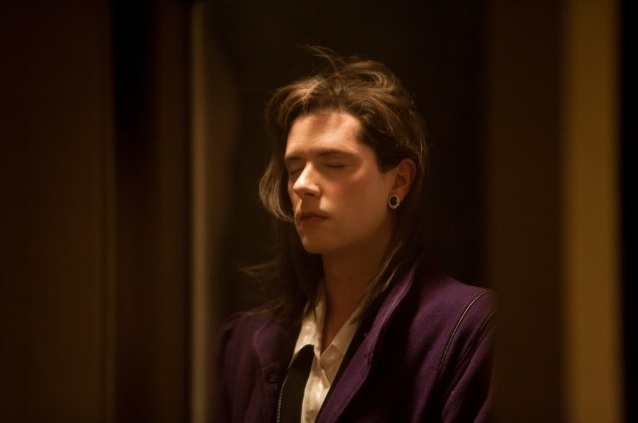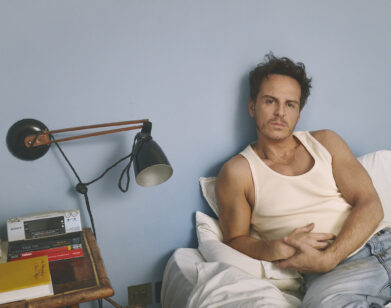Xavier Dolan’s Pleasure Principles

ABOVE: MELVIL POUPAUD IN XAVIER DOLAN’S LAURENCE ANYWAYS. IMAGE COURTESY OF LYLA FILMS
“I watched [Titanic] five times… You are a great actor and I admire you,” an eight-year-old Xavier Dolan once wrote in a letter to Leonardo DiCaprio, hopeful the star might one day shoot a movie in Dolan’s hometown, Montreal. At the time, the French-Canadian director was a child actor who had done, as he sweetly mentions in his note, “a few commercials for a very known drug store chain.” Fast forward 16 years, and Dolan has already directed a few movies that have all screened at very known film festival, Cannes: I Killed My Mother, Heartbeats, and now, Laurence Anyways, which comes out tomorrow, executive produced by Gus Van Sant.
Spanning the ’80s through to the ’90s, Laurence Anyways is the tumultuous on-again, off-again love story of Fred (Suzanne Clément) and Laurence (played by A Christmas Tale‘s Melvil Poupaud) who, on his 35th birthday, expresses his long-kept desire to become a woman. Theirs is a deep passion that seems made-up in their minds, almost Mad Lib-ed, like a fantasy world with only room for two. Their love is frenzied and abundant, like a duet that sparks and burns as if built to fail and as if begging for someone or something to intervene. As Dolan carefully shows, there’s nothing quite like the holidays, where private family conversations behind closed kitchen doors is where love often meets its match.
DURGA CHEW-BOSE: One of my favorite parts of the film is when Fred and Laurence list the things in life that minimize pleasure. I’m curious, what are some of the things in your life that minimize pleasure?
XAVIER DOLAN: When people ask me after a year and a half of interviews and after answering [the] question a thousand times —and I don’t know if you’re about to do so—people asking me how I had the idea for Laurence Anyways… that’s certainly on my list of things that minimize pleasure.
CHEW-BOSE: Well, I wasn’t planning on asking you that question, so we’re off to a good start.
DOLAN: We’re good! And there are other things obviously…
CHEW-BOSE: How about we come back to that question later. One thing that Laurence really explores is that fine line between being absolutely crazy about someone without losing one’s self in the process. Also, there was something so urgent about Fred and Laurence’s relationship. Even though they’re in their 30s, there was something almost adolescent about their intensity—in Laurence’s case, it’s clear why, but I was wondering if you could speak to their dynamic as a couple.
DOLAN: The problem with this couple is that they’re both teens. And maybe people stay that way, as post-teens almost, into their 20s and until they are 25 or something, but eventually people grow up. But they haven’t. They’re still kids. For Fred, I think that’s just the way it is. For some people, it takes longer. I have some 20something friends who act like they’re 40, and then there’s the opposite. Whatever the reasons are, I think there’s something beautiful and romantic about their adolescence—but there’s also something dysfunctional about it, and incompatible with society. Eventually it becomes about who you are in a couple and saying to the other, “Listen, I think we’re done with the whole honeymoon, and this is who I am for real.” I think that when you’re in love, you progressively go back to who you are. And then it’s make or break. They become adults when he comes out as a woman, because it’s a metaphor for coming out as who you are.
CHEW-BOSE: What was also great was how both Fred and Laurence’s day-to-day—their jobs, their family, all the people in their lives, etc.—were incorporated into their story, so as not to ignore how those very real aspects of life impact a relationship too.
DOLAN: I thought it was the key to this movie, and maybe succeeding in telling this story, to have a lot of characters—and I know it’s been read as a flaw to some people—to have characters that have mothers and sisters and friends and colleagues. For me, it was always clear that it would be a two-and-a-half-hour-long movie. It was obvious. But it was also obvious to me that I didn’t want my characters to be losers, and to have crazy fucking drama and span 12 years, and I knew that this would only be possible through getting to know people. Getting to see a scene in 1990 and then getting to see the same scene six years later, for me, was important. It was important to build a sense of memory and time, and abundance. I wanted to be an epic.
CHEW-BOSE: Can you talk about working with Melvil Poupaud?
DOLAN: In the 11th hour, the actor meant to play Laurence could no longer, and I called Melvil, who had originally read for a much smaller part. I called him, and a week later he was in Montreal and we were waxing his chest. Melvil is the most polite and kind, professional actor. He’s a beautiful person.
CHEW-BOSE: When we spoke a few years ago in a phone interview, you mentioned that it was grating for you when critics would always mention aesthetic influences that your works might have pulled from. Your films do have a richness, not just of colors, but of composition. In Laurence, there was the feeling that each frame was imagined and then meticulously executed. Can you talk a bit about how visually, the look of Laurence came to you?
DOLAN: Well, when you write you have ideas and dreams, but then you have to find locations that have limitations of their own.
CHEW-BOSE: But some of those rooms were sets that you built, right?
DOLAN: Yes, we did. Obviously you have to adapt yourself to wherever you are, but I see a lot of things when I’m writing—sometimes less, though. I just directed a music video for a French band, Indochine, and when I wrote the script, every shot was written down. It was the first time I had ever been so specific.
CHEW-BOSE: What’s your relationship like with your DP and the kind of conversations you have before shooting?
DOLAN: The best friend. There are three people I’m seeking the approval of on-set. In order, it’s my continuity girl with whom I’ve been working with forever, Natalie Paquette, and then my cinematographer, whoever it is for that project, and then I’ll ask my first assistant. I mean, I care about everybody’s opinions, and everyone’s welcome to chime in at any time. So my relationship with my DP—well, let me just say, I’m very, very involved in framing. It’s a constant collaboration.
CHEW-BOSE: Is there an environment that you don’t like shooting in because you can’t be in total control?
DOLAN: I hate kitchens. I hate kitchens. They’re visually hostile. First of all, appliances, they’re so ugly. Which reminds me of that scene in Bridesmaids when she calls the guy on the plane Stove when his name is Steve: “Stove, what kind of name is that? Are you an appliance?”
CHEW-BOSE: That’s like in Pretty in Pink when Duckie says, “Blaine?! His name is Blaine? That’s a major appliance, that’s not a name!”
DOLAN: Oh yeah? That’s funny.
CHEW-BOSE: So you hate kitchens.
DOLAN: Yes, they are unfriendly. It’s weird to find an angle, it’s weird to find a lens, and I’ll remember that forever. Next time, when I’m scouting, I’m going to look at kitchens with lenses. I’m never going to look at a kitchen in the same way. And I also hate news cars. They’re all ugly.
CHEW-BOSE: Ok, before my time is up, let’s go back to your list of things that minimize pleasure.
DOLAN: The fact that my asthma keeps me from having milk in my coffee. And mostly the fact that I still have milk in my coffee. The fact that I’m allergic to Jack Dawson, my little cat.
CHEW-BOSE: Jack Dawson like Titanic Jack Dawson…
DOLAN: Yes! Of course. Being allergic to Jack Dawson really minimizes my pleasure.
LAURENCE ANYWAYS IS OUT IN LIMITED RELEASE TOMORROW, JUNE 28.






